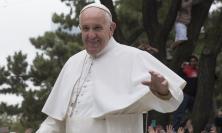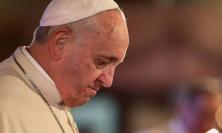Following his discussion of the way in which the language and practice of synodality has shaped the life of the Church in recent years, Cardinal Michael Czerny SJ considers how such a framework for relating to the gospel supports a preferential option for the poor. The future life and mission of the Church must be grounded in a prayerful listening to the cry of the poor and the cry of the earth, which Pope Francis himself models.
- Read part 1: Lumen gentium and the inverted pyramid >>
The ‘preferential option for the poor’ is conveyed strongly by the Prophets and in Matthew 25 and is expressed, in similar words, in the first sentence of Gaudium et spes (GS, 1965): ‘The joys and the hopes, the griefs and the anxieties of the men of this age, especially those who are poor or in any way afflicted, these are the joys and hopes, the griefs and anxieties of the followers of Christ.’ (GS §1, emphasis added) It became a focus of the 1971 Synod, ‘Justice in the World’, and St John Paul II and Pope Benedict XVI mainstreamed it into Catholic Social Teaching. If it is a hallmark of this papacy, it is not as a novelty but due to the vigour with which Pope Francis embraces its implications for proclaiming the gospel. Let’s see how the ecclesiology of communion, and collegiality and synodality play essential roles in implementing the option.
For Francis, the Church’s preferential option for the poor (Evangelii gaudium [EG] §48) follows the overwhelming logic of the Incarnation of the Word. Likewise, it flows from what the Word, Jesus Christ, taught us, in word and in deed, about the poor. Accordingly, the Church must recognise in this predilection the fundamental prerogative of the service of charity. The pope specifies that this is not a sociological preference but a properly theological one, because it leads back to God’s saving action: ‘Without the preferential option for the poor, “the proclamation of the Gospel, which is itself the prime form of charity, risks being misunderstood or submerged by the ocean of words which daily engulfs us in today’s society of mass communications”.’ (EG §199)
Furthermore, it is not an expression of a naive ‘do-goodism’, which takes shape in some activity, or a sort of a proclivity, but without actually representing an essential characteristic of the life of the Church. Rather, it must be recognised as an integral part, not only of the gospels, but also of the process of ecclesial transformation desired and initiated by Vatican II. The Council Fathers, in fact, recognising in the history of the least and the derelict a ‘sign of the times’, argued that the Church was called to pass from a charity of welfare handouts where the poor are reduced to mere ‘objects’ of care, to recognising them as ‘members’ of the People of God and ‘subjects’ of their own liberation.
In the encyclical Fratelli tutti (FT), among all the situations of fragility that characterise today’s social fabric and require an urgent response, the pope places at the forefront the emergency faced by refugees, migrants and internally displaced people, otherwise defined as the emergency of ‘borders and their limits’ (FT §129-32). Everyone in the Church and society is called to ‘welcome, protect, promote and integrate’ those who, for various reasons, are forced to leave their homeland, renouncing ‘their right not to emigrate’ (FT §38,129).
This means passing from a conception of society in which the stranger is discriminated against to an understanding of social coexistence in which full citizenship is guaranteed to all. Rather than ‘implementing welfare programmes from the top down’ (FT §129), it is necessary to offer effective and concrete possibilities for integration: granting visas, humanitarian corridors, access to essential services and education, religious freedom (FT §130).
The words of Francis, therefore, lead us back to the awareness with which Vatican II recognised, in the need to favour the poor, an appeal of the Holy Spirit to convert both the intra-ecclesial structures and the very way of relating to the gospel (Lumen gentium [LG] §8; GS §1). Granting the poor a privileged place among the members of the People of God (EG §187-96) not only means recognising them as privileged recipients of evangelisation but considering them as its subjects, its active agents.
Evangelii gaudium encourages all the baptised to consider the encounter with the poor as a favourable opportunity to allow themselves to be evangelised by Christ (EG §121,178). The contours of the distinction between the evangelisers and the evangelised are blurred: ‘We ought to let others be constantly evangelising us’ (EG §121,174). The poor are also evangelisers because, as members of the People of God, they have much to give and much to teach (EG §48). As Francis told the poor members of grassroots movements, ‘to me you are social poets because, from the forgotten peripheries where you live, you create admirable solutions for the most pressing problems afflicting the marginalized.’[i]
Encouraging the faithful to start again from the peripheries – not only the geographic but also existential ones[ii] – takes many forms. It can mean attention to social injustices and the personal sufferings of those in desperate situations – pain, poverty and misery. It can mean to take on everything in Matthew 25 and the rich tradition of the works of mercy. It can mean to appropriate the complex richness of the Amazon Synod’s single theme, ‘New Paths for the Church and for an Integral Ecology’, with its two elements intrinsically interdependent and linked.
From the Church’s vocation expressed in LG and its synodal path flow evangelisation, human promotion in all its forms and care for our common home. And when this new way of engaging the problems of the human family (EG §30) is taken up vigorously, as a matter of essence and necessity, the Church is helped to decentralise and impelled towards the peripheries. The Church, the People of God, should walk together, taking upon itself the weight of humanity, listening to the cry of the poor, reforming itself and its own action, first by listening to the voice of the humble, the anawim of the Hebrew Scriptures, who were at the heart of Jesus’s public ministry.
We can regard all this as a hermeneutical key that informs and redefines the synodal practice. It becomes necessary ‘to put all things in a missionary key’ (EG §34) and to adopt a multidimensional model of ecclesial and social unity (EG §234-37), reflecting a renewed intra-ecclesial and ecumenical sensitivity.
The reform that Francis invites us to accomplish works if it is ‘emptied’ of every worldly logic, that is, of the ideology of change as much as the ideology of staying put. The world values the ability to do things or to effect change institutionally always and everywhere and whenever. The reform encourages everyone to discern times and opportunities of ‘emptying’ so that the mission makes Christ shine through better. Now, when Francis calls ‘all Christians’ (EG §3) and ‘every person’ (Laudato si’ [LS] §3) ‘regardless of where he or she was born or lives’ (FT §1), to assume the responsibility[iii] summed up in ‘concern for the vulnerable’ (EG §209-216), he directs his attention not only to ‘poor’ people and also to the ‘poor’ earth.
Becoming sensitive to the ‘cry of the poor’ enables us to hear the cry of ‘sister earth’ (LS §1). Francis insists on the relationship between care for the environment and attention to the poor (LS §49), and he returns to it with ever greater clarity in Querida Amazonia (QA §52) and in his catecheses from August and September 2020.[iv] The connection between the poor and the environment allows us to focus on how the future of all humanity is intimately linked to that of the environment, and hence protecting the interests of the weakest coincides with safeguarding creation. ‘Everything,’ as Laudato si’ proclaims, ‘is connected’ (LS §16, 91,117,138,240).
Listening to the People of God, listening in them to the cry of the abandoned poor and of the maltreated earth, makes it possible for the Church to avoid the danger of projecting a preconceived scheme onto reality. The mistake occurs when, intent on reform, the Church pursues some ideal project which comes from desires, even good ones, which vehicle self-centredness. Were it so, it will end up obeying yet another merely ‘worldly’ ideology of change. When the Church accompanies the poor in their liberation, they in turn help the Church to liberate itself from the risks inherent in her own institutionalisation.
How to make synodality grow in the Church
The fundamental challenge that the synodal process poses to the Church’s life is that of a renewed understanding of ‘communion’, understood in terms of ‘inclusiveness’ of all the components of the People of God, especially the poor, under the guiding authority of those whom the Holy Spirit makes pastors of the Church, in such a way that everyone can feel co-responsible in the life and mission of the Church.
But how can synodality grow in the Church? Surely processes of conversion, that is, of ‘discernment, purification and reform’ (EG §30), need to get going so that everyone can acquire and internalise the principles of a spirituality that is open to ‘inclusive’ communion rather than a spirituality limited to seeking individual perfection. Without a real conversion in our ways of thinking, praying and acting, without an effective metanoia which involves a constant expansion of mutual acceptance, the externals or means of communion – the synodal ecclesial structures that developed from the conciliar event – could prove insufficient for achieving the purpose for which they were established.
The pope does not have prefabricated ideas to apply to reality, nor an ideological plan of ready-made, prêt-à-porter reforms. Rather, he advances on the basis of prayer and spiritual experience that he shares step-by-step in dialogue, in consultation, in concrete responses to so many human situations of vulnerability, suffering and injustice. This is, as St Ignatius would say, his ‘way of proceeding.’ Francis is establishing the structural conditions for real and open dialogue. These are not pre-packaged institutional improvements, nor armchair strategies for obtaining better indicators or statistics.
Maybe we still have a long way to go in understanding this deep reform of our institutional existence as followers of Jesus gathered in the Church. There is much more to understanding the semper reformanda Church in relationship with the times – including the current pandemic – in which we are living, trying to put together and appreciate the local, national, regional and continental Church, not to mention how, with hope, to imagine the future of Christianity.
Evangelii gaudium is written ‘to all the members of the Church with the aim of encouraging ongoing missionary renewal.’ (LS §3) Such reform consists in the never-ending synodal and evangelising conversion of each member of God’s People and of God’s People as a whole.
In her synodal life, the Church offers herself, deliberately, in diakonia or service of promoting an economic, social, political and cultural life marked by fraternity and social friendship. The priority undertaking and criterion of every social action of the People of God is to listen to the cry of the poor and that of the earth (LS §49), urgently recalling, when determining society’s choices and projects, the fundamental principles of the Church’s social teaching: inalienable human dignity, the universal destination of goods, the primacy of solidarity, dialogue aimed at peace and care for our common home.
The encouragement of Pope Francis, that ‘the Synod of Bishops must increasingly become a privileged instrument for listening to the People of God’ (EC §6), is at the same time a prayer and invocation: ‘We ask the Holy Spirit to grant the Synod Fathers the gift, first of all, of listening: to listen to God so as, with him, to hear the cry of the people; to listen to the people so as, amongst them, to breathe in what God wills and calls us to.’[v]
Let us pray, then, for whoever has responsibility in the Church, for whoever is involved in religious life, in Catholic education and in other services, to receive the same graces: to listen, to walk, to serve.
Cardinal Michael Czerny SJ is Under-Secretary of the Migrants and Refugees Section of the Dicastery for Promoting Integral Human Development.
This is an English translation and edition of the second part of ‘Verso una chiesa sinodale’ originally published by La Civiltà Cattolica 4093 (2/16 January 2021). Read part 1 >>
[i] Pope Francis, Letter to the Popular Movements (12 April 2020).
[ii] With reference to the teaching of St John Paul II, Francis describes poverty not only in material terms as indigence or neediness, but also identifying all forms of a person’s impoverishment such as limitations or damage to the dignity and fundamental rights of the human being (cf. John Paul II, Sollicitudo rei socialis (1987), §15).
[iii] The intention of addressing everyone is in continuity with the choice of the Second Vatican Council that ‘addresses itself without hesitation, not only to the sons of the Church and to all who invoke the name of Christ, but to the whole of humanity.’ (GS §2)
[iv] Pope Francis, To Heal the World: Catechesis on the Pandemic, Libreria Editrice Vaticana, 2020 (e-book: https://www.libreriaeditricevaticana.va/it/papa/516-to-heal-the-world.html)
[v] Pope Francis, Address at the Vigil of Prayer in preparation for the Synod on the Family (4 October 2014, translation revised by the author).






